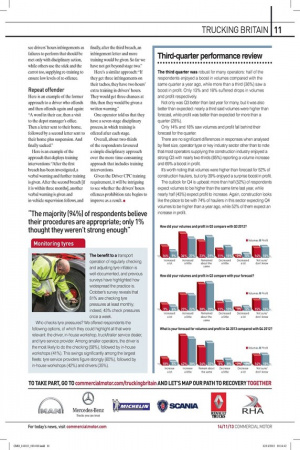rivers' hours offences: penalty or opportunity?
Page 7

Page 8

If you've noticed an error in this article please click here to report it so we can fix it.
October's Trucking Britain survey Looked at drivers' hours offences and how operators deal with them At Commercial Motor Live last month, Vosa chief executive Alastair Peoples said the prohibition rate for drivers' hours offences has continued to increase, and almost one fifth of all drivers checked at the roadside are in breach of the regulations to some extent. With this in mind, October's Trucking Britain survey looked at drivers'
hours rules and how operators approach these breaches. Nearly three-quarters (70%) of respondents said they have disciplinary procedures in place for those who breach drivers' hours. While this might sound like an appropriate penalty, it also means 17% have no such procedures in place (and, for the record, 13% were unsure if there are any procedures in their business). Naturally, proactive compliance trends with fleet size:
84% of operators with more than 50 trucks have procedures in place, but 'only' 61% of fleets with up to 10 trucks have procedures. The majority (94%) of respondents believe their procedures are appropriate; only 1% thought they weren't strong enough. We asked operators to tell us about their procedures, and their responses highlight two distinct approaches: reactive and proactive may be the best descriptions. There are those who
see drivers' hours infringements as failures to perform that should be met only with disciplinary action, while others use the stick and the carrot too, supplying re-training to ensure low levels of re-offence. Repeat offender
Here is an example of the former approach to a driver who offends and then offends again and again: "A word in their ear, then a visit to the depot manager's office. Then a letter sent to their home, followed by a second letter sent to their home plus suspension. And finally sacked." Here is an example of the approach that deploys training interventions: "After the first breach has been investigated, a verbal warning and further training is given. After the second breach [if it is within three months], another verbal warning is given and in-vehicle supervision follows, and
finally, after the third breach, an infringement letter and more training would be given. So far we have not got beyond stage two."
Here's a similar approach: "If they get three infringements on their tachos, they have two hours' extra training in drivers' hours. They would get three chances at this, then they would be given a written warning."
One operator told us that they have a seven-stage disciplinary process, in which training is offered after each stage.
Overall, about two-thirds of the respondents favoured a simple disciplinary approach over the more time-consuming approach that includes training interventions. Given the Driver CPC training requirement, it will be intriguing to see whether the drivers' hours offences prohibition rate begins to improve as a result. •








































